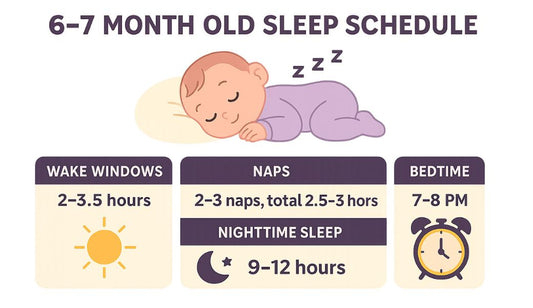
How Feeding Schedules Impact Baby Sleep Patterns
One of the biggest challenges new parents face is balancing feeding and sleep. Babies eat frequently, especially in the first months, and it can sometimes feel like their feeding schedule completely dictates the rest of the household’s rhythm. But as babies grow, the way feedings are spaced and structured can directly impact how well they sleep. Understanding the relationship between feeding schedules and baby sleep patterns helps parents create routines that support both proper nutrition and longer, more restorative rest. In this guide, we’ll explore how different feeding practices affect sleep, the importance of day and night balance, and tips for building a schedule that works for your family.
The Link Between Feeding and Sleep
Babies grow rapidly in the first two years, and sleep and feeding are closely connected to this growth. For newborns, feeding every two to three hours is necessary because their small stomachs cannot hold much milk. This naturally leads to fragmented sleep. As babies mature, their stomach capacity increases, and they can go longer between feedings, which in turn allows for longer stretches of uninterrupted sleep at night.
Feeding not only provides nutrition but also acts as a soothing activity. For many babies, nursing or bottle-feeding before bedtime creates a strong sleep association. While this can work in the short term, it may also lead to night wakings if the baby expects feeding as the only way to return to sleep. Balancing feeding schedules helps avoid these challenges and promotes healthier rest.
Daytime Feeding Patterns and Their Role
How often and how much a baby eats during the day plays a big role in nighttime sleep. Babies who feed well during the day are less likely to wake frequently from hunger at night. Some parents fall into the habit of letting babies “snack” often with short, light feedings. While this keeps babies satisfied in the moment, it can prevent them from getting enough calories in one sitting, leading to more night wakings.
Structured daytime feeding helps:
-
Ensure babies receive adequate nutrition during the day
-
Reduce reliance on night feeds
-
Support longer nighttime stretches of sleep
Many experts recommend offering full feeds during the day at regular intervals instead of frequent small snacks. This routine encourages babies to take in enough milk or formula to sustain them longer.
Nighttime Feeding and Sleep Consolidation
Night feeds are a normal part of infancy, especially in the first six months. However, as babies grow, many are capable of sleeping longer without needing to eat. The exact age when night feeds can be reduced depends on individual growth and development, but by 6 to 9 months, many babies can sleep through the night or with just one feeding.
Gradually stretching out the time between night feeds helps babies consolidate sleep. This doesn’t mean abruptly cutting feeds but rather offering reassurance in other ways, such as gentle rocking or soothing with a pacifier, if the baby wakes and isn’t truly hungry. Over time, babies learn to settle back to sleep without always needing a bottle or breast.
Common Feeding Mistakes That Disrupt Sleep
Some feeding habits unintentionally interfere with healthy sleep. Common mistakes include:
-
Feeding right before putting the baby down every time, which can create a strong sleep association
-
Allowing frequent nighttime snacking instead of encouraging full feeds
-
Not distinguishing between hunger cues and comfort-seeking cues
-
Overfeeding close to bedtime, which can cause discomfort and restlessness
Avoiding these pitfalls helps babies develop the ability to sleep independently while still receiving the nutrition they need.
Building a Balanced Feeding and Sleep Schedule
Creating a predictable routine that balances feeding and sleep supports both nutrition and rest. While every baby is different, some general principles apply:
-
Space daytime feeds about every 2.5 to 4 hours, depending on age
-
Encourage full feeds instead of grazing throughout the day
-
Include a bedtime feed as part of the nighttime routine, but avoid making it the only sleep cue
-
Gradually reduce night feeds as your baby shows readiness, often with your pediatrician’s guidance
Many families find that a consistent schedule makes life easier. Babies learn what to expect, parents gain more structure in their day, and nighttime rest often improves as a result.
Feeding and Nap Schedules
Naps are an important part of baby sleep, and feeding schedules directly influence nap quality. If a baby goes down for a nap hungry, they may wake early. On the other hand, putting a baby down immediately after a large feed can sometimes cause discomfort. Striking the right balance is key.
Some parents follow an “eat-play-sleep” routine, where babies feed upon waking, engage in play or activity, and then nap before the next feeding. This approach separates feeding from sleep, reducing reliance on nursing or bottles as the only way to drift off. It also ensures babies nap with a fuller stomach, making longer, more restorative naps possible.
The Role of Bedtime Routines
A bedtime routine that incorporates feeding can be effective, as long as it isn’t the sole cue for sleep. A typical routine might include:
-
A warm bath
-
Changing into pajamas
-
A final feed in a calm environment
-
Reading or singing a lullaby
-
Placing the baby in the crib drowsy but awake
Including feeding as one step in the sequence helps babies feel satisfied and ready for rest while still learning to fall asleep independently.
Using Tools to Support Feeding and Sleep Routines
Alongside consistent schedules, certain tools can make sleep transitions smoother. A white noise machine, for example, can mask household sounds and help babies connect sleep cycles without waking. Combined with balanced feeding habits, white noise creates a calming sleep environment that supports better rest. Blackout curtains, comfortable sleep sacks, and predictable bedtime rituals further reinforce the connection between feeding and sleep.
Final Thoughts
Feeding schedules and baby sleep patterns are deeply connected. In the early months, frequent feeds naturally lead to short sleep stretches, but as babies grow, structured feeding helps pave the way for longer and more restorative rest. Ensuring that babies receive full daytime feeds, reducing reliance on night feedings over time, and separating feeding from sleep cues all contribute to healthier sleep habits. By pairing balanced feeding schedules with a soothing sleep environment and consistent routines, parents can help their babies rest well while still meeting all nutritional needs.








